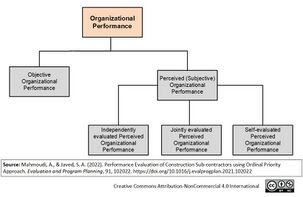Organizational performance
Topic: Organization
 From HandWiki - Reading time: 4 min
From HandWiki - Reading time: 4 min

Organizational performance comprises the actual output or results of an organization as measured against its intended outputs (or goals and objectives). Organizational performance is also the success or fulfillment of organization at the end of program or projects as it is intended. According to Richard et al. (2009) organizational performance encompasses three specific areas of firm outcomes: (a) financial performance (profits, return on assets, return on investment, etc.); (b) product market performance (sales, market share, etc.); and (c) shareholder return (total shareholder return, economic value added, etc.).[2] The term Organizational effectiveness[3] is broader.
Specialists in many fields are concerned with organizational performance including strategic planners, operations, finance, legal, and organizational development.
In recent years, many organizations have attempted to manage organizational performance using the balanced scorecard methodology where performance is tracked and measured in multiple dimensions such as:
- financial performance (e.g. shareholder return)
- customer service
- social responsibility (e.g. corporate citizenship, community outreach)
- employee stewardship
- Organizational performance[3]
- performance measurement systems[3]
- performance improvement
- organizational engineering
- Pluralistic stakeholder values
See also
- Organizational performance management.
People involved in research
- Rosabeth Moss Kanter
References
- ↑ Mahmoudi, Amin; Javed, Saad Ahmed (2022). "Performance Evaluation of Construction Sub‐contractors using Ordinal Priority Approach". Evaluation and Program Planning 91: 102022. doi:10.1016/j.evalprogplan.2021.102022. ISSN 0149-7189. PMID 34736766. https://www.sciencedirect.com/science/article/abs/pii/S0149718921001178.
- ↑ Richard, Pierre J.; Devinney, Timothy M.; Yip, George S.; Johnson, Gerry (2009-02-06). "Measuring Organizational Performance: Towards Methodological Best Practice". Journal of Management (SAGE Publications) 35 (3): 718–804. doi:10.1177/0149206308330560. ISSN 0149-2063.
- ↑ 3.0 3.1 3.2 Upadhaya, Bedanand; Munir, Rahat; Blount, Yvette (2014). "Association between performance measurement systems and organisational effectiveness". International Journal of Operations & Production Management (Emerald) 34 (7): 853–875. doi:10.1108/ijopm-02-2013-0091. ISSN 0144-3577.
Further reading
- Defining success through strategic planning and priority goal setting
- The Balanced Scorecard
- Scrum Training (in German)
- Organizational Performance Management
 KSF
KSF